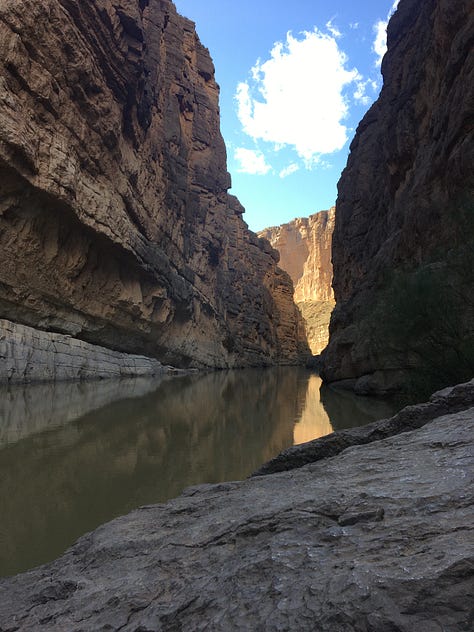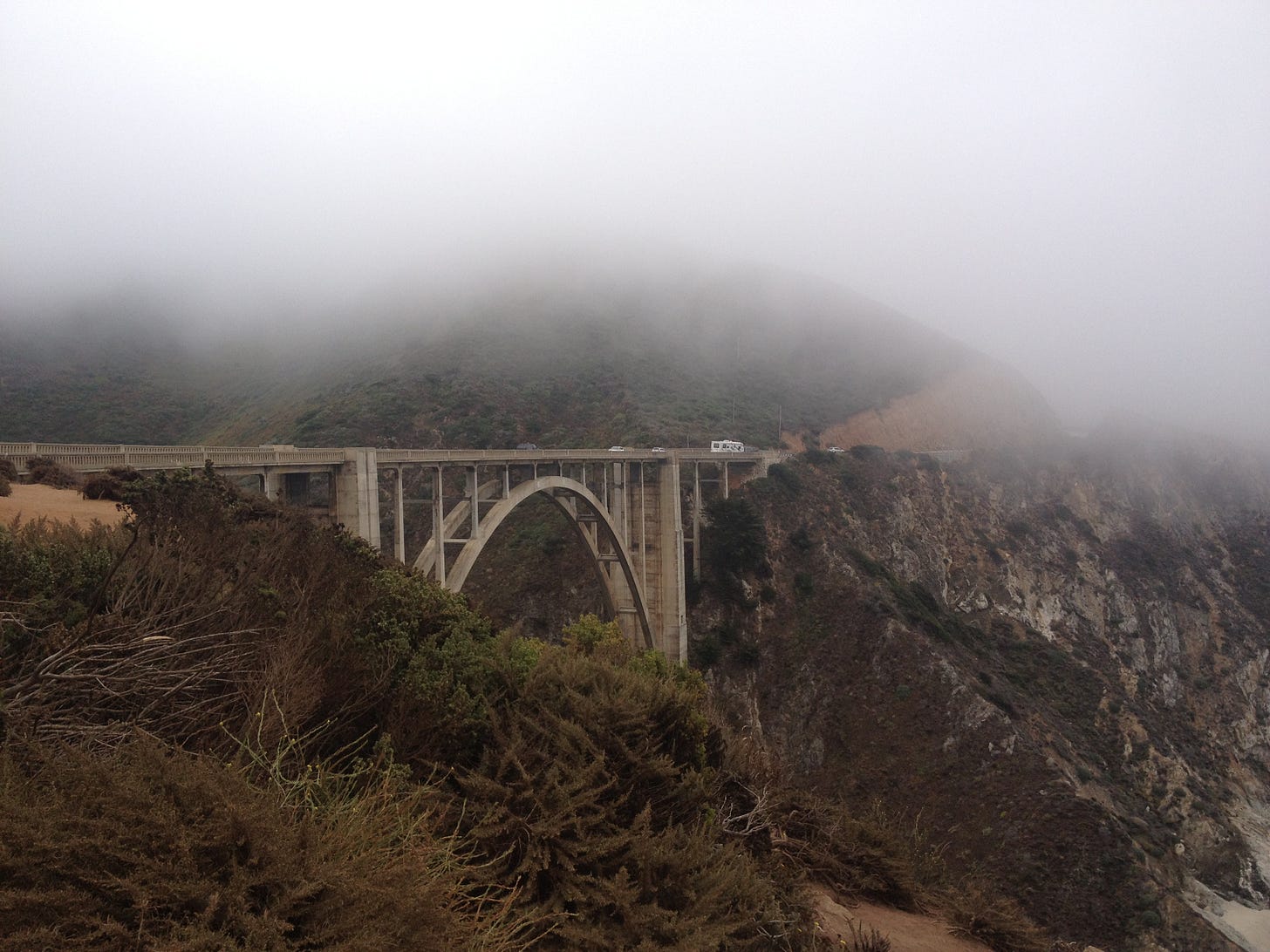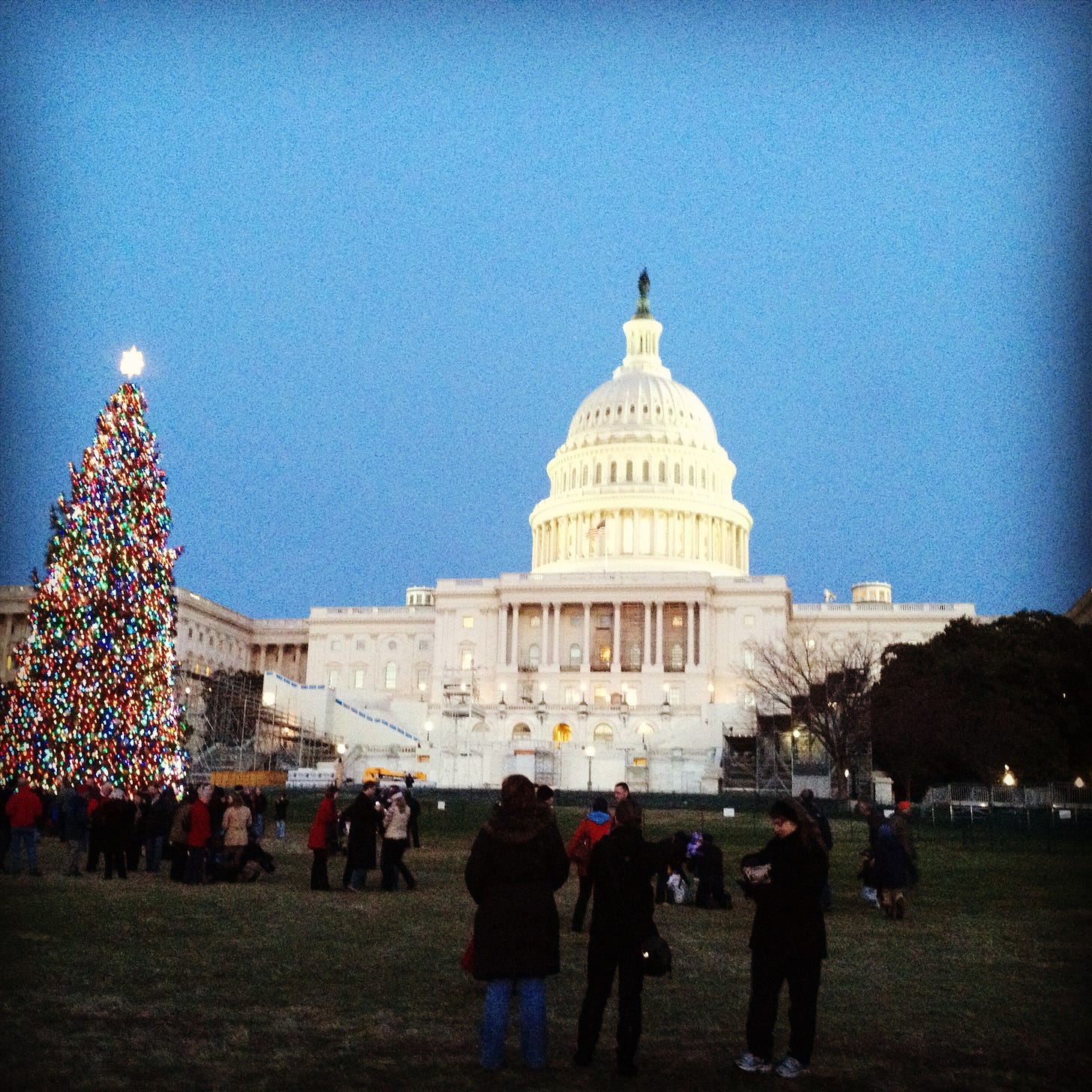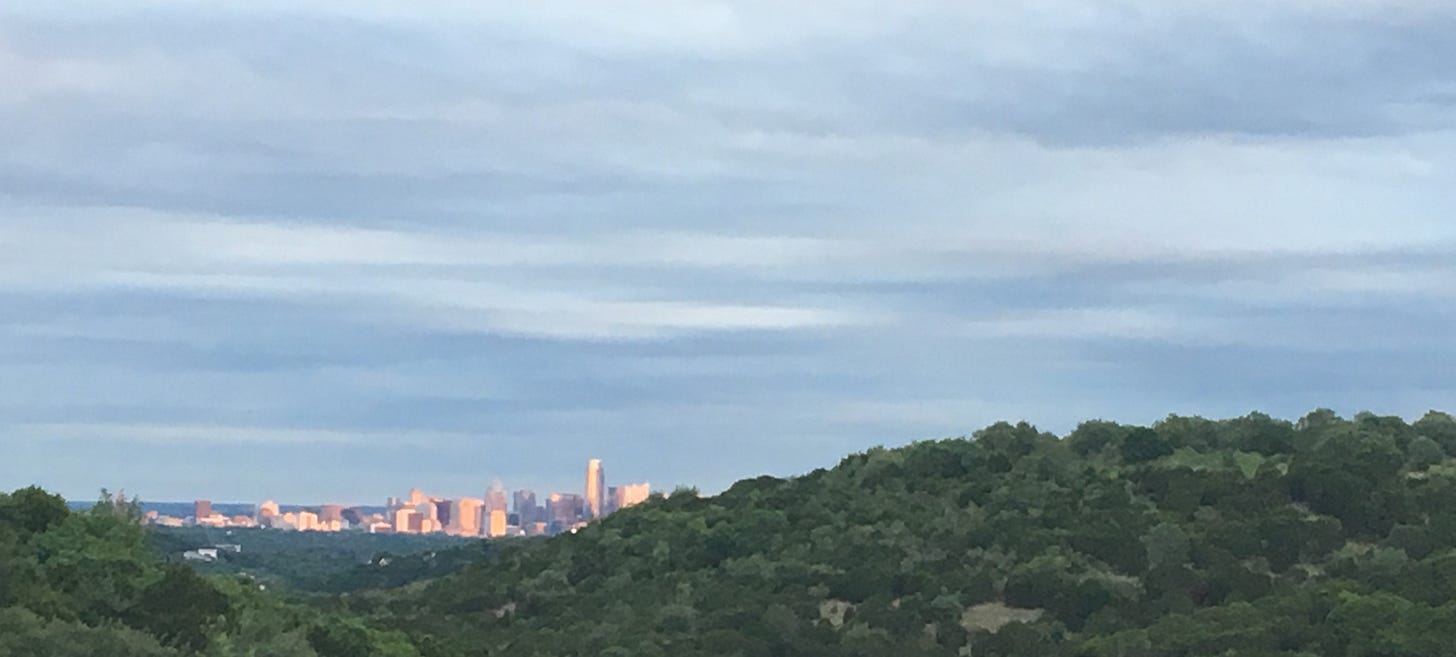Note: “Third coast” is a term that’s often used in the art world to refer to cultural centers that aren’t coastal, i.e. not New York and LA. This summer, I spent a lot of time thinking about Texas as cultural and personal Third Coast. I wrote this post several weeks ago but have been toying with how much of it I want to share.
If you’d told me when I was 20 that, before I was 40, I’d have a decade-long relationship with Texas, I would have laughed. I spent the George W. Bush years swearing I’d never set foot here. A lot of my friends in college were from Texas (thanks to a super-weird funding rule related to the arts and sports and Texas’s love of football that I don’t fully understand), and I rolled my eyes at their pining for Blue Bell and Whataburger. Their joy in seeing snow for the first time was charming, but I also found it provincial. I’m cringing as I write about that attitude now. It was reductive and unkind. It’s very coastal, in some ways, too; generalizing as large a state of Texas as any one thing is about as short-sighted as people who live on a coast saying that all midwestern states are the same.
I moved to Austin for grad school in 100 degree heat and spent the first 2.5 years I lived here wondering exactly what I was doing. I melted on the walk from my car to my classes, spent the year open campus carry became legal terrified, and tried to figure out exactly how to drive on a frontage road. I had come in very set on getting out of Texas as soon as the ink was dry on my diploma. I applied for what felt like a million jobs all over the country, flew out for at least three out-of-state, final round interviews, and made pro/con lists about the cities where those jobs were. What I missed, while I was doing all of this, was how much getting off the plane at ABIA had started to feel like coming home. And how much happier I was because the temperature rarely dipped below 30. And what 300 days of sunshine felt like. And the profound joy of roadside wildflowers coming into bloom in early March. I also picked up “y’all” as a gender-neutral term (and a perfect contraction), a deep belief in the superiority of HEB, and a commitment to patios above all else. But, despite all this joy, I was so focused on “getting out of Texas” that I didn’t realize that I’d fallen at least a little in love with Texas until I’d already made plans to leave it.
California in my experience is a mythical fairyland - I’ve loved it every time I’ve visited - the laid back vibes and the friendliness and the ocean everywhere. I can never move there because it would ruin the magic. I’m way too Type A for California. The fact that nothing starts before 10 and no one is ever on time for anything - it would drive me bananas. In the midst of a couple of epically California days during my visit this summer - acai bowls and beach days and random strangers talking to me about yoga - I was reminded of the way that Texas has seeped into my words when I said, “Yes, ma’am” to the employee who was looking up my botanical garden membership at the Lady Bird Johnson Wildflower Center for the purpose of the reciprocal entry fee. She said something to the effect of, “Oh, yeah, Texas for sure, if you say ma’am.” Thinking I was being rebuked (reasonably) for the gendered language that I STILL struggle to eschew, I apologized immediately, and she said, “oh, no it’s okay, I think it’s respectful, I just never hear it here.” To her, if not fully to myself, I was a Texan.
The out-of-placeness of feeling like there’s no way I could live somewhere has followed me. Growing up, I felt out of place in the midwest because, while I loved livestock and being outside in the woods, I didn’t care about sports and didn’t understand small-town politics. Similarly, I was too other things for the east coast, where I assumed I would fit right in. I love Washington D.C. deeply; the approach into National Airport is my favorite in the world. I’m also increasingly convinced that I would not do well there long-term and that some of the rosy glow it holds is because I was 22 when I lived there (traffic and cost of living mean more now than they did then). I had wanted to live in DC because I was swept up in the West Wing fervor in the early aughts, and, while I don’t think I’ll ever let that go fully, I didn’t take well to people judging my friends’ clothes or my driving or what books I’d read or where I’d gone to school. My ambition and exactitude, which had been described as “too much” my entire life, didn’t hold a candle to the other young professionals who live there; the idea of not being intense enough is laughable to almost everyone who knows me, but that is deeply how I felt about DC.
Another part of the east coast I thought had promise was North Carolina, during the time when I was “escaping Texas” after grad school. But it turned out that “too Type A for California” also meant “too hippie for North Carolina;” I got a lot of looks for my cowboy boots and wearing jeans to inappropriate locations and for balking at lots of questions about where I went to church. I left every social gathering exhausted from trying to hold up a set of social norms that I didn’t understand and apologizing every time I mis-stepped.
I’ve had a lot of feelings about not knowing where to live - too much for the midwest, not enough for the East Coast, altogether wrong for California. When it became clear that North Carolina wasn’t working, all I knew was that I didn’t have the energy to start over again; my husband and I weighed DC and Austin. After months of pro/conning and exhaustive discussion, I felt no closer to a decision until I woke up at 3am one morning with a very clear gut feeling. I shook him awake and said, “it’s Texas. I want to move to Texas.” He, rightly, said, “ummmm…okay” and went back to sleep. But when he asked in the morning if I remembered it, if I meant it, if it still held true, I had nothing to do but nod in confirmation. Within a week, I was working on my Texas teacher certification. I was thrilled to get back to the sunshine and HEB and not having to worry about what clothes I wore to what (one of my favorite things about Austin is seeing people show up to the same bar on the same night in ballgowns and cutoffs and no one batting an eyelash at any of them).



It is reasonable to look at the national news about Texas and wonder why people choose to live (or teach) here. The state’s politics are difficult to stomach, and spending on things like education and healthcare is not what it should be, which has very real impacts for people living here (And while “Austin isn’t really Texas” is a fun saying, the idea that state policies don’t affect Austinites is flawed - ask me about school funding and recapture on a day you have some time). If you think it’s nuts to live here, I don’t blame you. But it’s the second most populous state in the country and, Wikipedia (unreliable-yet-weirdly-reliable) indicates an almost 16% increase in people living here in three-ish years. And lots of people were born here and stay here and make positive change. People are choosing to live here, and they’re not all people who support regressive policies.
All of this became glaringly clear for me during the freeze that Austin suffered in 2021. The power grid all but collapsed. We were out of power and/or water for 6 days. During this time, Ted Cruz, you may remember, flew to Mexico. Which honestly was the least of my concerns; I was focused on driving on questionable roads to get water from a brewery (a privilege in and of itself), and why were any of us surprised that he would make a wildly selfish choice at an inopportune moment? But it spurred a lot of social media commentary, including from a Californian friend of mine, that amounted to “Texans deserve what’s happening to them because they elected this person.”
I didn’t know that I thought of myself as a Texan until I read that post. My response was something to the effect of, “hey, there are lots of people in Texas doing good work and who are impacted by these bad policies; right now, none of us have water and telling us this is our fault is not helping, can you please not?” We had a good back-and-forth about it, had different levels of context when we were finished, and, I’d venture to say, probably were both more careful about our words moving forward. What was wild for me was the feeling of “I live here. I can complain about my people, but you can’t. These are my people.” It was a sense of place in this place that I never meant to live but can’t seem to leave. [Clearly: Ted Cruz is not one of my people. But many of his many constituents are.]

So, yes, the politics are a mess. But I can’t see how me leaving fixes any of that. I’ve testified during a committee hearing on the Senate floor against a bill on classroom censorship that went on to pass, but was drug out a long way because of the amount of resistance. Hearing colleagues who’ve been here way longer than me talk about how they, too, have been raising their voices for decades about other regressive education policies helps me feel seen and validated in my urgency AND the nature of the long game. There’s also something to be said when the adversary is out in the open - I know that the legislature is not friendly to the human-first policies that I believe in, and it can be helpful just to KNOW. In other places, namely on those coasts, there are also oppressive policies, but they are often cloaked in progressivism that can make them harder to fight, in some ways; in Texas, I know what I’m dealing with.
It’s also worth noting that my Texas school is the first not-primarily-white space I’ve ever existed in. In every other educational institution, every other cultural institution, every other nonprofit organization, I was a member of a very significant majority. I’m not a perfect teacher for my students (my Spanish pronunciation is so bad that last year, when I thought I was telling a student to put her phone in her backpack, what she heard was “put your phone in your knife;” we had a good laugh about that, and then a conversation about how knives had no place in school and how cell phones had great places in backpacks), but I believe in their brilliance, and I’m changing the way I see the world to understand it more through their eyes so I can better serve them.
Late this summer, a friend of mine from my yoga studio made a point that I’d never considered. Her family has roots in Mexico, and she said to a group of three midwestern transplants (an awful lot of that 16% of new people and the many before those years are from the midwest) how much she likes midwesterners. She went on to say that she saw a parallel between midwesterners and Hispanic culture; there’s a sense of welcome, of openness, of inviting people to your house and making sure they’re fed and offering support during challenging times. I never expected to make a connection between Mexico and casserole culture (or hotdish, depending on which part of my midwestern experience you’re focusing on) and certainly not in a yoga studio, but there we all were, in Texas, together.
And essentially, it’s this that I love about my Third Coast: there’s a spirit that makes space for a variety of ways of being (in your day, if not legally - an ongoing battle that people continue to find creative ways to fight). It’s not a paradise by any means, but there’s a lot going for it, and there’s a lot of it that resonates with the parts of the way I deal with the world that didn’t quite fit anywhere else. So I try to bring my midwestern humility to my interactions and my East Coast fire to my advocacy for change, and my Californian chill (what little of it I have) to the traffic, to treat what used to feel so foreign how it feels now: like home.
If you’ve made it to this point: congratulations. That was a lot. I’d love to hear your thoughts about place or coasts or finding where you fit.
I’ve love to see you at the last practice of October tonight! Click below to register. Please note the time change: 6pm CDT.











Three years ago, I moved back home to Vancouver Island from the US in the wake of a tough life transition. The city and towns and hikes are all familiar, but I've changed and it's strange to be building a new relationship with this place as an adult. I didn't think much of the Island when I was young, but the forests and mountains and rain and wildlife all feel more rare and important to me now. There's definitely something about finding a home, even with all of the difficulties that come with it.